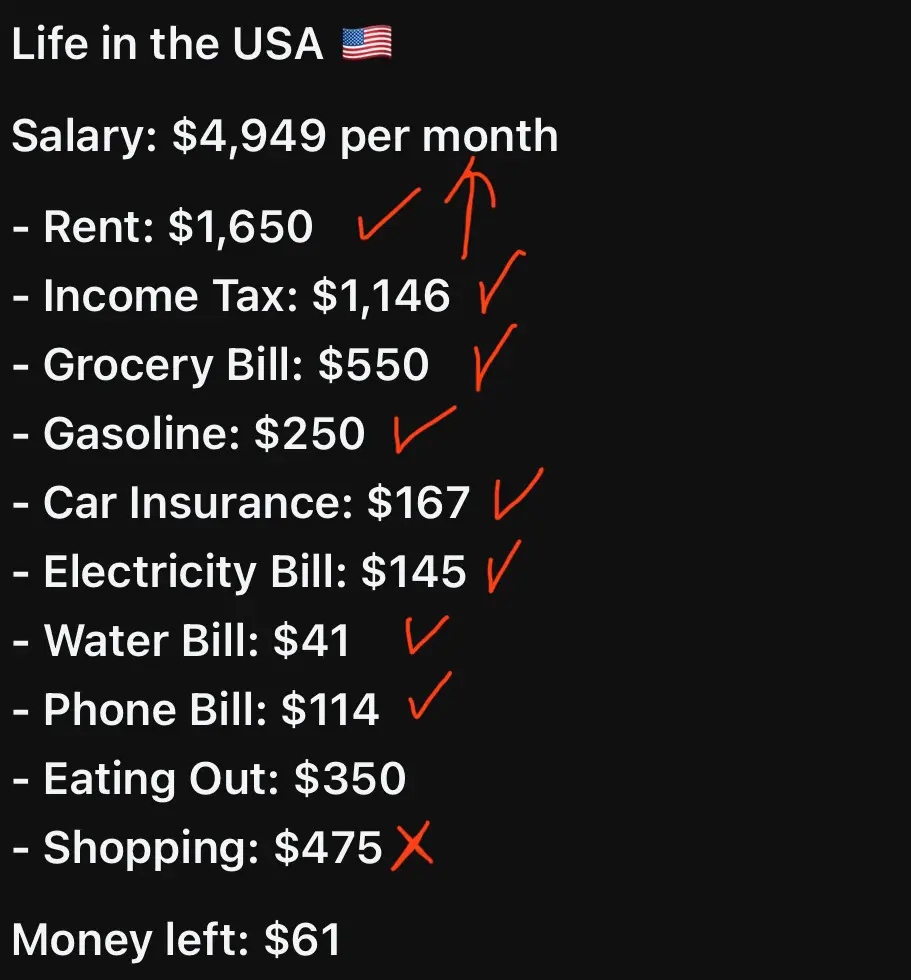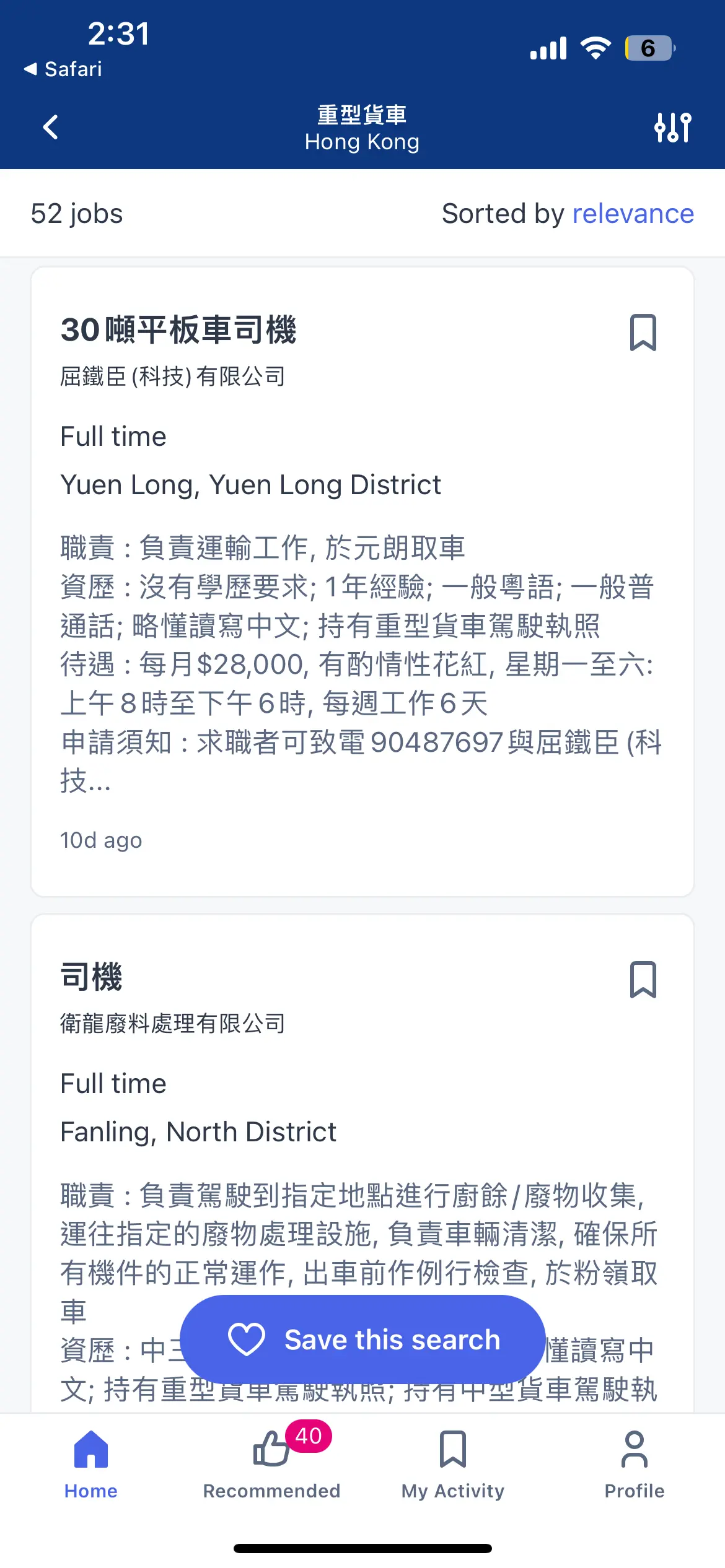投胎是門學問!美國底層本地人薪金分享
HK生活水平US7成
334 回覆
202 Like
84 Dislike
大把司機40幾蚊一粒鐘,空姐50 60蚊一粒鐘,有乜咁奇,香港係窮人好窮有錢人好有錢就不嬲架啦
加州低收入、65歲以上基本上醫療唔使錢
質素接近香港私家
大部分打工,公司都有包埋保險
全家只要有一人返工,全家就有保險
有保險之下,睇醫生每次20美金
所有手術照x光保大約 8到9成
質素接近香港私家
大部分打工,公司都有包埋保險
全家只要有一人返工,全家就有保險
有保險之下,睇醫生每次20美金
所有手術照x光保大約 8到9成
美國空姐咁高人工? 香港空姐慘不忍睹
香港空姐慘不忍睹
 香港空姐慘不忍睹
香港空姐慘不忍睹原來係真
不過佢170000 係total compensation =/= Salary. 雖然已經高到難以置信
不過學呢個post 話
https://www.reddit.com/r/OutOfTheLoop/s/dwdNGujsWV
how much are they actually paid?
This Yahoo article included the numbers and the quote from the CEO:
To avoid a worker strike, UPS agreed on July 25 to provide $30 billion in new money over a five-year period to boost wages, benefits, and working conditions for employees. It set a minimum wage for part-time workers at $21 an hour and full-time workers at $49 an hour on average, making them the "highest paid delivery drivers in the nation," the union said. This deal has yet to be approved by union members.
UPS CEO Carol Tomé said on an earnings call this week that full-time drivers would earn about $170,000 annually in salary and benefits by the end of the five-year period. These drivers currently earn, on average, about $95,000 a year with a further $50,000 in benefits.
So the top-end, senior, full-time, union, UPS driver will make up to $49/hr - bringing them to right around $100k/yr salary. To get to the $170k figure, they are including benefits - which can mean things like the value of their health insurance, retirement plans, life insurance, and other random benefits. You can see what UPS offers here and see that $50k value repeated.
When you add your pay to the value associated to your benefits, that's what most people call "Total Compensation". The new UPS contract tops out at a total compensation package of around $170k. Not base salary.
so how is UPS able to stay competitive while paying this much for a relatively low-skilled job?
Well, you're jumping directly into the "Why do the rich get richer?" part of the conversation. UPS makes around $80-100B annual revenue. After costs, their net income is around $10B/yr source. They adjusted their operating margin down one point - from 12.8% to 11.8% - to account for the impact of the new contract. Operating margin is essentially profit per dollar. So for every $1, they made $0.12. After the agreement, they'll make $0.11.
Putting aside all of the white collar vs blue collar discussions, what it boils down to is the fact that corporations are making record profits right now. However, in most of those companies, the only people who really benefit are the large shareholders - not the workers. In a different Yahoo article, a small, but significant blurb is mentioned:
UPS said Tuesday that it will pare its management ranks by 2,500 jobs to help keep expenses in check.
This means that while UPS will sign its new contract with the drivers (assuming it's approved by the Teamsters), UPS still answers to its shareholders. So while they can't fire any of the drivers, they have to show that they will cut costs somewhere else. This "somewhere else" will come in the form of 2500 office jobs - workers who are probably not protected by a union.
UPS makes a lot of money. After they sign the contract, they will continue to make a lot of money. The only difference is that now, their drivers benefit a little more from the company's success.
This is essentially the entry point for the "Death of the middle class" conversation - which is way too long to just tack on here as an afterthought. I'd suggest reading up on it through articles like this, this, or this. There's tons more out there.
最後只會減少其他工種啲數量平衡返. 好定壞就睇你咩角度睇

不過佢170000 係total compensation =/= Salary. 雖然已經高到難以置信
不過學呢個post 話
https://www.reddit.com/r/OutOfTheLoop/s/dwdNGujsWV
how much are they actually paid?
This Yahoo article included the numbers and the quote from the CEO:
To avoid a worker strike, UPS agreed on July 25 to provide $30 billion in new money over a five-year period to boost wages, benefits, and working conditions for employees. It set a minimum wage for part-time workers at $21 an hour and full-time workers at $49 an hour on average, making them the "highest paid delivery drivers in the nation," the union said. This deal has yet to be approved by union members.
UPS CEO Carol Tomé said on an earnings call this week that full-time drivers would earn about $170,000 annually in salary and benefits by the end of the five-year period. These drivers currently earn, on average, about $95,000 a year with a further $50,000 in benefits.
So the top-end, senior, full-time, union, UPS driver will make up to $49/hr - bringing them to right around $100k/yr salary. To get to the $170k figure, they are including benefits - which can mean things like the value of their health insurance, retirement plans, life insurance, and other random benefits. You can see what UPS offers here and see that $50k value repeated.
When you add your pay to the value associated to your benefits, that's what most people call "Total Compensation". The new UPS contract tops out at a total compensation package of around $170k. Not base salary.
so how is UPS able to stay competitive while paying this much for a relatively low-skilled job?
Well, you're jumping directly into the "Why do the rich get richer?" part of the conversation. UPS makes around $80-100B annual revenue. After costs, their net income is around $10B/yr source. They adjusted their operating margin down one point - from 12.8% to 11.8% - to account for the impact of the new contract. Operating margin is essentially profit per dollar. So for every $1, they made $0.12. After the agreement, they'll make $0.11.
Putting aside all of the white collar vs blue collar discussions, what it boils down to is the fact that corporations are making record profits right now. However, in most of those companies, the only people who really benefit are the large shareholders - not the workers. In a different Yahoo article, a small, but significant blurb is mentioned:
UPS said Tuesday that it will pare its management ranks by 2,500 jobs to help keep expenses in check.
This means that while UPS will sign its new contract with the drivers (assuming it's approved by the Teamsters), UPS still answers to its shareholders. So while they can't fire any of the drivers, they have to show that they will cut costs somewhere else. This "somewhere else" will come in the form of 2500 office jobs - workers who are probably not protected by a union.
UPS makes a lot of money. After they sign the contract, they will continue to make a lot of money. The only difference is that now, their drivers benefit a little more from the company's success.
This is essentially the entry point for the "Death of the middle class" conversation - which is way too long to just tack on here as an afterthought. I'd suggest reading up on it through articles like this, this, or this. There's tons more out there.
最後只會減少其他工種啲數量平衡返. 好定壞就睇你咩角度睇
正常香港後生做解款狗都廿幾k啦
你個fd廢到仆街
你個fd廢到仆街
咁調返轉講
例如香港出街食野係平個其中一個主因係餐飲業人工低 試吓人工追到歐美加貴租 點樣50/60 蚊食個lunch
不過清潔洗碗個啲真係低,好多人都已經話請唔到人。我估遲早會入外勞
例如香港出街食野係平個其中一個主因係餐飲業人工低 試吓人工追到歐美加貴租 點樣50/60 蚊食個lunch

不過清潔洗碗個啲真係低,好多人都已經話請唔到人。我估遲早會入外勞

Costco 福利好好
 ,入到好似一世無憂
,入到好似一世無憂

 ,入到好似一世無憂
,入到好似一世無憂自己煮飯食就應該好正
出去食飯為主我諗食到窮
出去食飯為主我諗食到窮
要幾弱智先講得出呢句野

正呀 美國做企鵝都年薪百萬港幣

喺thread睇到 我覺得都唔差得遠

係shopping唔洗shop咁多
eating out 都因人而異
我有屋企人做空姐
大陸人去到果邊都好搵得,主要係佢地工時長,又現金出糧,做餐廳就包食包住
牛排平過
好多latinos都係 喺美國搵
將錢寄返自己國家係買地起屋
將錢寄返自己國家係買地起屋

外賣自取省返tips
DoorDash仲有5%回饋
DoorDash仲有5%回饋
講左本地家庭正常生兩個小朋友一定冇,當然你話計埋401k咁我冇野好講
你香港搵呢個數交既tax+mpf都要-10%,而且連人地正常fica既養休金都不如
你香港搵呢個數交既tax+mpf都要-10%,而且連人地正常fica既養休金都不如

唔生小朋友差好遠?
不過香港最屈機唔係salary tax 低,係冇capital gain tax ,estate tax 同埋dividend tax , old money 食父幹屈錢一流
不過香港最屈機唔係salary tax 低,係冇capital gain tax ,estate tax 同埋dividend tax , old money 食父幹屈錢一流
稅後幾多
工業制品呢
都有小小印花稅既,好似你係香港收租都要交差響物業稅,管理費,打里印
近親轉讓都會收少少稅
冇capital gain tax係真既
近親轉讓都會收少少稅
冇capital gain tax係真既
香港渣大車有4-5萬一個月喎
多數呢d都係收現金小費wo, 一定要計稅後,米85%以上,$23.5*0.85=$20美金一個鐘
放心,我無意途吹捧香港,香港唯一用處只係搵錢(暫時),不過我個人偏好新加坡多過美國。
重型貨車普遍兩萬尾啦

香港做小巴司機仲低
汽車交通運輸業總工會公共小巴分會主任陳逢源表示,現時本地小巴司機薪金中位數為14,300元,但政府輸入外勞聘用外勞的成本達2至3萬元,更會為其支付考取小巴駕駛執照費用、提供員工宿舍、購買勞工保險等費用,反問政府為何不提高本地小巴司機的薪金。


香港做小巴司機仲低

汽車交通運輸業總工會公共小巴分會主任陳逢源表示,現時本地小巴司機薪金中位數為14,300元,但政府輸入外勞聘用外勞的成本達2至3萬元,更會為其支付考取小巴駕駛執照費用、提供員工宿舍、購買勞工保險等費用,反問政府為何不提高本地小巴司機的薪金。